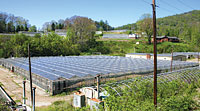Charles Clouse says he’d rather grow tomatoes than build condos on his West Asheville property.

Clouse, who won a former poinsettia nursery in a lawsuit, owns a complex that includes nearly 24 acres under glass plus warehouses, furnaces, pumps, a lake and an electrical generator big enough to power a small village (see “Green from Grime,” May 30 Xpress). Unlike would-be developers, however, he wants to return the greenhouses to use—only this time to grow organic food.
Marilyn Vestal read about Clouse’s dreams of organic splendor and immediately phoned organic grower Chuck Marsh. Marsh shared Vestal’s excitement. “I couldn’t sleep that night,” he says. “The possibilities are endless.”
Marsh contacted Clouse and Glenda Rice of Emerald Acres Market LLC—a company formed to manage the nursery complex. Then he rounded up acquaintances who he guessed might be interested in the project, and they gathered at the greenhouses on July 10. The group’s goal is to reopen the facility as an organic growing, research and education center and a hub for regional food-security planning.
Greenhouse expert Ratus Fischer of EcoWorks Water Management conducted an initial inspection of the complex. “Growing could begin here at any time,” he reported. He said there is a rising demand for organic flowers, medicinal herbs and pharmaceutical-plant research as well as organic food, and that the prospects for profit are strong at the facility. He estimated the cost of returning the greenhouses to service as roughly $10,000 per acre.
There was discussion of how to organize the reopening. Frank Adams, a worker-owned-business expert with the Southern Appalachian Center for Cooperative Ownership, suggested that, for numerous reasons, creating a for-profit business, perhaps a worker-owned LLC, was more practical than establishing a nonprofit.
Peter Marks of the Appalachian Sustainable Agriculture Project argued that however the facility is run, it should not provide subsidies to farmers. “We can’t undercut the market for other farmers by underwriting the growers here,” he said. “That doesn’t help build the local farm economy.”
The group also addressed the question of how to recruit growers. Growers may be asked to buy in, to become “sharecroppers” or to rent space. There was general agreement that the group would aim to begin production in some segment of the complex by next January, with cleanup and refurbishment starting by late this fall.
Organic farmer Tom Elmore, who works with the Land of Sky Regional Council, and Extension Agent Amanda Stone, an expert in commercial horticulture with the N.C. Cooperative Extension, offered their expertise as well.
Marsh, Clouse and Stone are eager for interested growers to contact them. Fischer and Marsh have slated a unit-by-unit audit of the facilities, with an eye on deciding where to start the rehab and what work needs to be done to preserve the whole facility until production can be ramped up. The group will meet again before the end of July to move toward a formal structure and issue a request for proposals.
For more information, contact Clouse at 280-8985, Rice at 258-9263 or Stone at 255-5522.



i live right down the street from these greenhouses, and i just want to publicly thank the owner of this land for protecting it, and for bringing this into our little pocket of greenness and quiet. when i first saw these greenhouses i had some fantastical visions of what they could be (yes, exactly!) and i also had nightmares of it all disappearing for rows of condos (and ensuing idiots) and ruining what is currently a beautiful and green little pocket of rustic quiet (which is why i decided to move here in the first place). i am thrilled beyond belief about our upcoming new neighbors, and i’m ready to be involved in any capacity that i can.